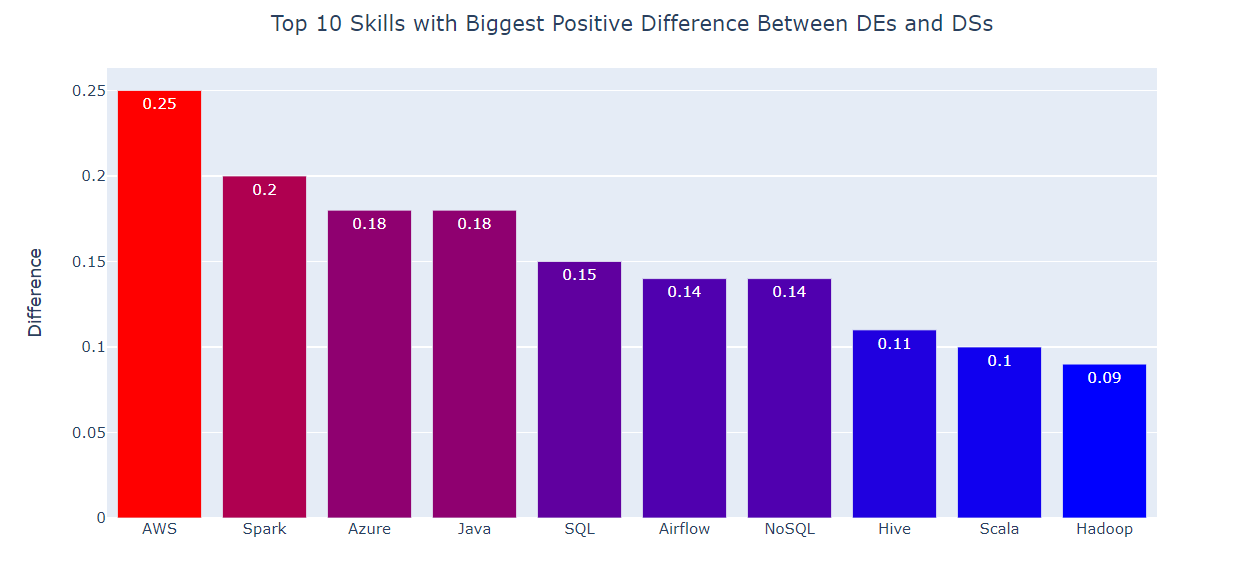The Most In Demand Skills for Data Engineers in 2021
If you are preparing to make a career in data or are looking for opportunities to skill-up in your current data-centric role, then this analysis of in-demand skills for 2021, based on over 17,000 Data Engineer job postings, should offer you a good idea as to which programming languages and software tools are increasing and decreasing in importance.

After writing The Most In-Demand Skills for Data Scientists in 2021, I wanted to replicate the same analysis for data engineers as it is increasing in demand at a rapid pace. According to Interview Query’s Data Science Interview report, the number of data science interviews only grew by 10% from 2019 to 2020, while the number of data engineering interviews grew by 40% in the same period of time!
Again, I want to preface and say that this is heavily inspired by Jeff Hale’s articles that he wrote back in 2018/2019. I’m writing this simply because I wanted to get a more up-to-date analysis of what skills are in demand today, and I’m sharing this because I’m assuming that there are people out there that also want to see an updated version of the most in-demand skills for data engineers in 2021.
Take what you want from this analysis — it’s obvious that the insights gathered from web scraping job postings are not a perfect correlation to what data science skills are actually most demanded. However, I think this gives a good indication of what general skills you should focus more on, and likewise, stray away from.
With that said, I hope you enjoy this and let’s dive in!
Methodology
For this analysis, I web scraped and accumulated over 17,000 job postings from Indeed, Monster, and SimplyHired. I didn’t web scrape LinkedIn because I ran into Captcha issues trying to scrape it.
I then checked to see how many job postings included each term that I was searching for. The lists of terms that I was searching were as follows:
- Python, SQL, R, Java, Git, C, MATLAB, Excel, C++, JavaScript, C#, Julia, Scala, SAS
- Scikit-learn, Pandas, NumPy, SciPy
- Matplotlib, Looker, Tableau
- TensorFlow, PyTorch, Keras
- Spark, Hadoop, AWS, GCP, Hive, Azure, Google Cloud, MongoDB, BigQuery
- Docker, Kubernetes, Airflow
- NoSQL, MySQL, PostgreSQL
- Caffe, Alteryx, Perl, Cassandra, Linux
After getting the counts from each source, I summed them up and then divided them over the total number of data engineer job postings to get a percentage. For example, Python’s value of 0.76 means that 76% of the total job postings had Python in them.
Finally, I compared the results from the data engineer analysis to the data scientist analysis to see how the two roles differed.
Results
Top 25 Skills for Data Engineers
Below are the top 25 most in-demand data engineer skills in 2021, ranked from highest to lowest:

Top Programming Languages for Data Engineers
To get a more granular look, the chart below shows the top programming languages for data engineers:

There are two main differences to point out between the top programming languages for data engineers vs. data scientists: One, the % of jobs that require SQL is much higher for data engineers — this makes sense because SQL is required to build data pipelines, table views, etc. Two, the % of jobs that require R for data engineers is much smaller. And so, if you’re someone that wants to keep both doors open (data engineers and data scientists), then I’d recommend learning Python instead of R.
Top 10 Skills with the Biggest Positive Difference Between Data Engineers and Data Scientists
The charts below show the skills with the biggest difference in percentages between data engineers and data scientists:

Unsurprisingly, cloud computing skills and Apache’s big data products like Spark, Hive, and Hadoop are much more important for data engineers than data scientists, which makes sense because a data engineer’s job is focused on building and maintaining an organization’s data infrastructure. Airflow is also much more important for a data engineer, as it is slowly becoming the go-to technology for workflow scheduling.
Top 10 Skills with the Biggest Negative Difference Between Data Engineers and Data Scientists

Similarly, the chart above is not surprising, as most of these skills are focused on data modeling and data analysis, which is more in the realm of a data scientist than a data engineer.
Overall
Overall, the differences for all skills analyzed are provided in the graph below:

I hope that you found this analysis useful. I wouldn’t completely justify a decision for choosing to learn one skill over another solely based on this resource, but as I said before, I think this gives a good idea as to what is increasing and decreasing in importance.
Related:
